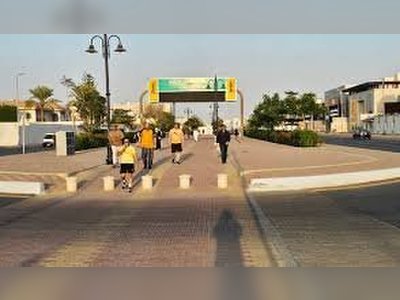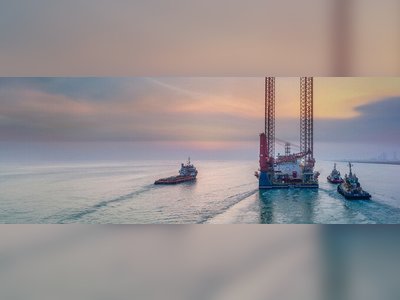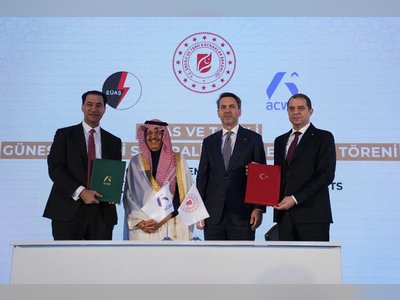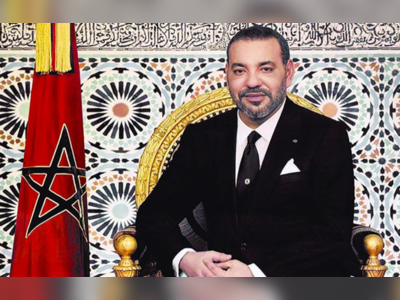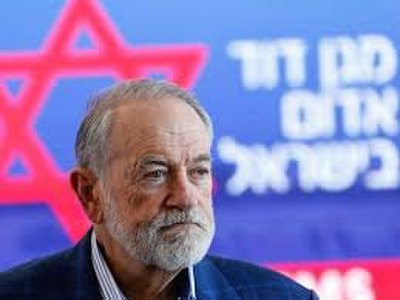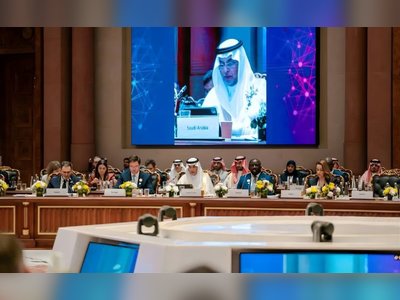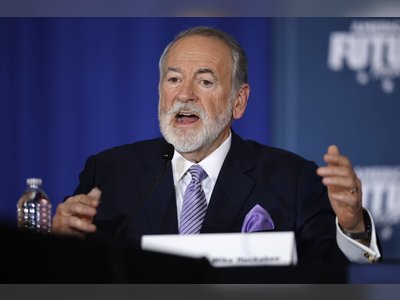
Saudi Arabia’s ambitious space program provides foretaste of exciting collaborations to come
The state-funded body has struck cooperation agreements with the European Space Agency, UK, France and Hungary
More than half a century ago, Neil Armstrong and Buzz Aldrin became the first people to set foot on the surface of the moon. Since this historic milestone, governments, scientists and now entrepreneurs have set their sights on more distant and ambitious goals.
From Jeff Bezos’ forays into space tourism with Blue Origin and Elon Musk’s dream of establishing colonies on Mars to NASA’s launch of the James Webb Space Telescope and the UAE’s Hope probe mission to Mars, space, it seems, is once again all the rage.
The Apollo astronauts’ momentous moonwalk of July 20, 1969, marked the culmination of more than a decade of breakneck scientific advance, fueled by the fierce Cold War-era contest between the US and the Soviet Union known as the “space race.”
Decades later, and with the benefits of vastly superior technologies, private sector finance, and a global profusion of scientific and engineering talent, a new space race led by the world’s emerging economies and wealthiest individuals is now underway.
A recent entrant in this new space race is the Saudi Space Commission, or SSC, launched three years ago by royal decree — its mission: To accelerate economic diversification, enhance research and development, and raise private sector participation in the global space industry.
Since its launch in December 2018, the Kingdom’s state-funded space program has struck deals with the European Space Agency, the UK, France, and Hungary to further cooperation.
The agency has also signed agreements with aerospace giant Airbus, joined the International Astronautical Federation, and launched illustrious scholarship programs to allow Saudi students to attend the world’s best universities offering courses in space sciences and aerospace engineering.
Although its space agency is relatively new, the Kingdom has a long history of involvement in satellite technology, much of it emanating from the King Abdul Aziz City of Science and Technology in Riyadh.
Saudi Arabia also played a key role in the Arab League’s formation of Arabsat, a satellite communications company, which launched its first satellite in 1985.
“The beauty is that you’re not starting from zero,” Col. Chris Hadfield, retired Canadian astronaut and former commander of the International Space Station, told Arab News in an exclusive interview.
“Even NASA, when they were formed in the late 1950s, they weren’t starting from zero. NACA, which was the predecessor to NASA, had been around since the 1920s, when the government recognized that aeronautics was coming.”
Hadfield is well known for his hugely popular video segments depicting life aboard the ISS, which famously included a zero-gravity guitar rendition of David Bowie’s "Space Oddity."
A heavily decorated astronaut, engineer and pilot, his many awards include the Order of Canada, the Meritorious Service Cross and the NASA Exceptional Service Medal. He was also named the top test pilot in both the US Air Force and the US Navy, and was inducted into Canada’s Aviation Hall of Fame.
Hadfield has flown three space missions, building two space stations, performing two spacewalks, crewing the Shuttle and Soyuz, and commanding the ISS.
Now retired, he is an adjunct professor at the University of Waterloo, Ontario, an adviser to SpaceX and Virgin Galactic, board chair of the Open Lunar Foundation, and the author of three international bestsellers. His TED talk on fear has been watched 11 million times.
In Hadfield’s view, the SSC should now set out to clearly define its goals for the future of Saudi space exploration.
“The real key is to have a clear purpose for what the space agency is trying to accomplish, aims that are in line with serving the people of Saudi in the short and long term,” he said.
The ISS remains a potent symbol of human fraternity as well as the huge technological and scientific possibilities on offer when societies work toward a common end.
The space station’s history began on July 17, 1975, when Russian cosmonaut Alexei Leonov and American astronaut Deke Slayton shook hands in microgravity, having docked their spacecraft high above the French city of Metz.
The handshake was the byproduct of a 1972 agreement between the two nations to cooperate on the Apollo-Soyuz Test project. The US built a docking module for the Apollo shuttle that was compatible with the Soviet docking system to allow a flawless rendezvous.
Their meeting became a powerful symbol of unity, which paved the way for the joint Shuttle-Mir program and later the ISS itself.
Building a space agency is no easy feat. As a multidisciplinary domain, the industry demands a wide range of skills and expertise. Saudi Arabia has invested heavily in the sector and already has several achievements to its name.
In February 2019, the Kingdom launched its first domestically developed communications satellite — SGS-1 — from the Guiana Space Center. The launch was the result of a partnership between KACST and US aerospace giant Lockheed Martin.
In 2020, Saudi Arabia announced plans to invest $2.1 billion in the space program as part of its Vision 2030 reform agenda, the Kingdom’s long-term plan to diversify its economy away from oil and embrace a wide array of next-generation industries.
“In the time we live in now, space is becoming a fundamental sector of the global economy, touching every aspect of our lives on Earth,” Prince Sultan bin Salman, the first Arab, Muslim and royal in space, said at the time.
“Space business and the space economy are expected to grow into the trillions of riyals as we go forward. We believe there are a lot of opportunities that exist in the space sector and we, in Saudi Arabia, intend to tap these opportunities at all levels.”
In order to excel in space, the Kingdom will need an army of technical specialists in areas as diverse as cybersecurity, avionics and robotics, together with experts in propulsion, machine learning and artificial intelligence.
“If you look right across the world’s governments, there’s some subset that is working in the areas that are naturally space related, like telecommunications, atmospheric physics, weather forecasting or the military side of threats; there’s always the high ground advantage,” Hadfield told Arab News, highlighting the benefits of building a domestic space industry.
“It’s scientific in just trying to understand the Earth better. If you can go around (Earth) 16 times a day, if you can set a geostationary satellite that is looking at the whole (Arabian) peninsula, that whole part of the world, there is a huge amount of information to be gathered that is really difficult to gather from the surface.
“Then there is the technological development side. If you’re going to challenge yourself to build a satellite or build rocket ships or train people to fly to space or be part of the space station, start setting up a permanent human habitation on the moon, that’s a big technological challenge and that is good for the country from the academic side right through to the manufacturing side.”
But more than the obvious economic, scientific and strategic benefits, Hadfield believes investment in space technologies also provides societies with a sense of optimism and raises public aspirations.
“Apart from the scientific research and the technical development, it is raising people’s eyes beyond the horizon,” he said.
“Space exploration has a significant role in inspiring people to visualize a different future, to attempt things with their own lives, to train themselves to gain a new set of skills and turn themselves into somebody different in pursuit of being an astronaut that otherwise they might never have done with themselves. That, to me, that’s an important component.”
Saudi Arabia is well placed to capitalize on falling costs of launching rockets, advances in technology, and a growing public interest in space exploration. Its willingness to work with other space agencies is also a foretaste of exciting collaborations to come.
Reflecting on his own career in space, Hadfield said it is this kind of human fraternity, together with an enduring sense of duty, that will empower further innovations and new milestones in space exploration.
“It’s a life of service,” he said. “Service to agency, service to country and service to others.”
When a Saudi went to space
Prince Sultan bin Salman speaks exclusively to Arab News about his 1985 NASA mission and how he became the first Arab, Muslim and royal in space
From Jeff Bezos’ forays into space tourism with Blue Origin and Elon Musk’s dream of establishing colonies on Mars to NASA’s launch of the James Webb Space Telescope and the UAE’s Hope probe mission to Mars, space, it seems, is once again all the rage.
The Apollo astronauts’ momentous moonwalk of July 20, 1969, marked the culmination of more than a decade of breakneck scientific advance, fueled by the fierce Cold War-era contest between the US and the Soviet Union known as the “space race.”
Decades later, and with the benefits of vastly superior technologies, private sector finance, and a global profusion of scientific and engineering talent, a new space race led by the world’s emerging economies and wealthiest individuals is now underway.
A recent entrant in this new space race is the Saudi Space Commission, or SSC, launched three years ago by royal decree — its mission: To accelerate economic diversification, enhance research and development, and raise private sector participation in the global space industry.
Since its launch in December 2018, the Kingdom’s state-funded space program has struck deals with the European Space Agency, the UK, France, and Hungary to further cooperation.
The agency has also signed agreements with aerospace giant Airbus, joined the International Astronautical Federation, and launched illustrious scholarship programs to allow Saudi students to attend the world’s best universities offering courses in space sciences and aerospace engineering.
Although its space agency is relatively new, the Kingdom has a long history of involvement in satellite technology, much of it emanating from the King Abdul Aziz City of Science and Technology in Riyadh.
Saudi Arabia also played a key role in the Arab League’s formation of Arabsat, a satellite communications company, which launched its first satellite in 1985.
“The beauty is that you’re not starting from zero,” Col. Chris Hadfield, retired Canadian astronaut and former commander of the International Space Station, told Arab News in an exclusive interview.
“Even NASA, when they were formed in the late 1950s, they weren’t starting from zero. NACA, which was the predecessor to NASA, had been around since the 1920s, when the government recognized that aeronautics was coming.”
Hadfield is well known for his hugely popular video segments depicting life aboard the ISS, which famously included a zero-gravity guitar rendition of David Bowie’s "Space Oddity."
A heavily decorated astronaut, engineer and pilot, his many awards include the Order of Canada, the Meritorious Service Cross and the NASA Exceptional Service Medal. He was also named the top test pilot in both the US Air Force and the US Navy, and was inducted into Canada’s Aviation Hall of Fame.
Hadfield has flown three space missions, building two space stations, performing two spacewalks, crewing the Shuttle and Soyuz, and commanding the ISS.
Now retired, he is an adjunct professor at the University of Waterloo, Ontario, an adviser to SpaceX and Virgin Galactic, board chair of the Open Lunar Foundation, and the author of three international bestsellers. His TED talk on fear has been watched 11 million times.
In Hadfield’s view, the SSC should now set out to clearly define its goals for the future of Saudi space exploration.
“The real key is to have a clear purpose for what the space agency is trying to accomplish, aims that are in line with serving the people of Saudi in the short and long term,” he said.
The ISS remains a potent symbol of human fraternity as well as the huge technological and scientific possibilities on offer when societies work toward a common end.
The space station’s history began on July 17, 1975, when Russian cosmonaut Alexei Leonov and American astronaut Deke Slayton shook hands in microgravity, having docked their spacecraft high above the French city of Metz.
The handshake was the byproduct of a 1972 agreement between the two nations to cooperate on the Apollo-Soyuz Test project. The US built a docking module for the Apollo shuttle that was compatible with the Soviet docking system to allow a flawless rendezvous.
Their meeting became a powerful symbol of unity, which paved the way for the joint Shuttle-Mir program and later the ISS itself.
Building a space agency is no easy feat. As a multidisciplinary domain, the industry demands a wide range of skills and expertise. Saudi Arabia has invested heavily in the sector and already has several achievements to its name.
In February 2019, the Kingdom launched its first domestically developed communications satellite — SGS-1 — from the Guiana Space Center. The launch was the result of a partnership between KACST and US aerospace giant Lockheed Martin.
In 2020, Saudi Arabia announced plans to invest $2.1 billion in the space program as part of its Vision 2030 reform agenda, the Kingdom’s long-term plan to diversify its economy away from oil and embrace a wide array of next-generation industries.
“In the time we live in now, space is becoming a fundamental sector of the global economy, touching every aspect of our lives on Earth,” Prince Sultan bin Salman, the first Arab, Muslim and royal in space, said at the time.
“Space business and the space economy are expected to grow into the trillions of riyals as we go forward. We believe there are a lot of opportunities that exist in the space sector and we, in Saudi Arabia, intend to tap these opportunities at all levels.”
In order to excel in space, the Kingdom will need an army of technical specialists in areas as diverse as cybersecurity, avionics and robotics, together with experts in propulsion, machine learning and artificial intelligence.
“If you look right across the world’s governments, there’s some subset that is working in the areas that are naturally space related, like telecommunications, atmospheric physics, weather forecasting or the military side of threats; there’s always the high ground advantage,” Hadfield told Arab News, highlighting the benefits of building a domestic space industry.
“It’s scientific in just trying to understand the Earth better. If you can go around (Earth) 16 times a day, if you can set a geostationary satellite that is looking at the whole (Arabian) peninsula, that whole part of the world, there is a huge amount of information to be gathered that is really difficult to gather from the surface.
“Then there is the technological development side. If you’re going to challenge yourself to build a satellite or build rocket ships or train people to fly to space or be part of the space station, start setting up a permanent human habitation on the moon, that’s a big technological challenge and that is good for the country from the academic side right through to the manufacturing side.”
But more than the obvious economic, scientific and strategic benefits, Hadfield believes investment in space technologies also provides societies with a sense of optimism and raises public aspirations.
“Apart from the scientific research and the technical development, it is raising people’s eyes beyond the horizon,” he said.
“Space exploration has a significant role in inspiring people to visualize a different future, to attempt things with their own lives, to train themselves to gain a new set of skills and turn themselves into somebody different in pursuit of being an astronaut that otherwise they might never have done with themselves. That, to me, that’s an important component.”
Saudi Arabia is well placed to capitalize on falling costs of launching rockets, advances in technology, and a growing public interest in space exploration. Its willingness to work with other space agencies is also a foretaste of exciting collaborations to come.
Reflecting on his own career in space, Hadfield said it is this kind of human fraternity, together with an enduring sense of duty, that will empower further innovations and new milestones in space exploration.
“It’s a life of service,” he said. “Service to agency, service to country and service to others.”
When a Saudi went to space
Prince Sultan bin Salman speaks exclusively to Arab News about his 1985 NASA mission and how he became the first Arab, Muslim and royal in space


